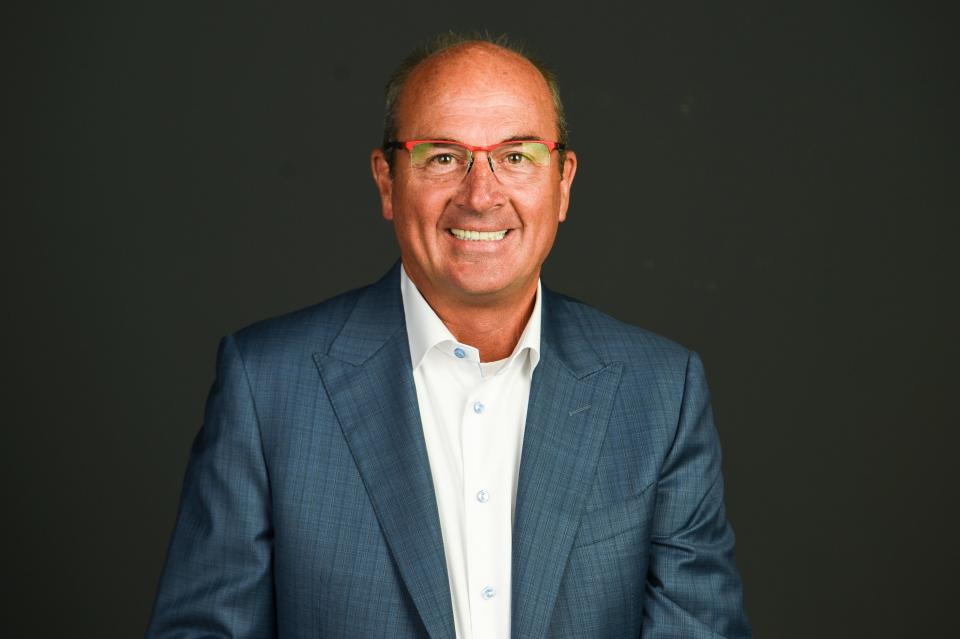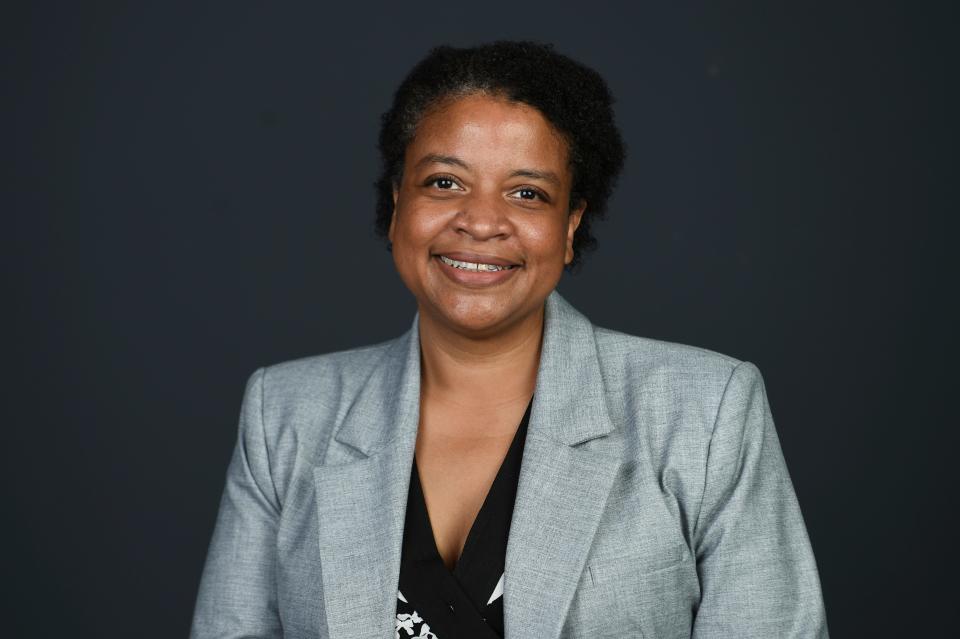Knoxville City Council At-Large, Seat C: Get to know the candidates
- Oops!Something went wrong.Please try again later.
Knoxville City Council member Amelia Parker is running for another term in At-Large Seat C, and faces Tim Hill in the general election after both of them beat out Matthew Best in the August primary. Parker won the most votes, but only by 4%.
Parker, executive director of Peace Brigades International-USA, has been extensively involved in empowerment organizations and movements throughout her career.
Hill is president of Hatcher-Hill Properties, a real estate development firm, and serves as chair of the Knoxville-Knox County Planning Commission.
Here are the candidates' summarized responses from their interviews with Knox News.
Tim Hill

Housing
For Hill, it’s simple; we need more housing. He said the city needs to focus on adding to Knoxville's low housing supply, bringing it up to the area's high demand.
“We've got to build our way out of it and it's gonna take time,” Hill said. “(Knox) County can be an important partner as well because, as we develop the new general plan for Knox County, we can utilize that ring around the city to add housing that'll help serve our city.”
He’d like to see diversity among housing types, building apartments and missing middle housing and not just single-family homes. He sees Knoxville Mayor Indya Kincannon’s proposal to make missing middle housing easier to build in the city as a start, but he said it wouldn’t make a huge dent in the housing crunch.
Hill was a vocal proponent of delaying the planning commission's vote on the plan.
Developing residential structures along major corridors is something he'd like to see more of.
Homelessness
Hill said that in order the create solutions for the unhoused community, the city needs to have "multiple partners."
"It's a big, expensive, complicated matter that our city is dealing with," he said. "We need to make sure we're properly supporting our nonprofits that specialize in helping and treating our individuals who are dealing with homelessness, or mental illness or addiction."
He said he thinks addiction is a symptom of mental illness, which can "often" lead to homelessness.
"The city gets its best value and the best bang for its buck when we support nonprofits who are specialists in this field."
He said it's important for the city to help fund nonprofits that will give unhoused members of the community the tools to succeed, not just put them in housing.
"We've got to treat the sickness or the underlying condition and get them into the right resources. Resources can mean the right type of housing, not just general housing."
Business development
When considering business development propositions, Hill said he would look at the “cost-to-benefit ratio” of the proposal. In other words, he wants to know whether the proposal's benefits are worth the city's time, effort and resources.
Hill said he wouldn’t be afraid to be the lone dissenting vote if he did or didn't believe in a proposal. However, he said he was hardly - if ever - the sole dissenting vote while serving as chair of the Knoxville-Knox County Planning Commission.
“I'm not that person. I'm a cost-to-benefits person,” Hill said. “I believe that you can work a beneficial deal, and it doesn't have to be exactly my way.”
Taxes
As for the city's spending, Hill said he thinks the budget reflects the needs of the community, which are "ever-changing. "So next year may be a different set of priorities. Ten years ago, (there was) a different set of priorities."
He thinks Kincannon's administration has responded to the city's needs, listing COVID-19 policies and housing challenges as examples.
Programs in the budget, he said, are examples of "a public policy to motivate the private sector to get out there and build more housing."
Stadium
When it comes to the development of the neighborhoods around the forthcoming Old City baseball stadium, Hill said the city will have to monitor that as it goes.
He would like to see a mix of residential and retail spaces built in the surrounding areas, but wants them to be developments that best serve the area, which has historically seen disinvestment.
To encourage development, Hill said it's on the city council and the rest of the government to create a business-friendly environment to bring amenities and jobs to the areas, which wouldn’t be a new concept for Knoxville.
“We rebuilt downtown Knoxville largely because of public policy that set the stage for the private industry to come in and be motivated to grow our economic base.”
Violence
Hill fully supports efforts to reduce violence and crime that are geared toward an approach that keeps communities safe and separates criminals from the general public.
He is particularly supportive of the real-time crime center and believes surveillance and collection of data to measure efforts is necessary. He does not believe in reducing the budget for the police department to go toward other initiatives.
"I don't believe in substituting one for the other. When it comes to alternatives to policing I would say absolutely not."
Amelia Parker

Housing
While housing stock is low in Knoxville, it’s also become largely unaffordable for many. Parker would like to see the city incentivize affordable housing developments using tools like the Homemakers Program, as well as more projects from Knoxville’s Community Development Corporation.
Parker said missing middle housing could be a good option, but she wants more time to study it for any unintended consequences. She also said it’s not an affordable solution since there aren't restrictions on how much those developments could sell or rent for.
“Our focus as a city needs to be on housing for the most vulnerable in our community (and) affordable housing,” Parker said.
She said major corridors should be prioritized as areas for housing development since there’s already strong existing infrastructure there.
Homelessness
Parker said she's been working since she was elected to combat homelessness, but the solutions she wanted to bring forward were preempted by the state making camping in public spaces a felony in 2022.
She shifted her solutions to fit around non-congregate shelter options. Those are shelters where individuals and households have their own private spaces. The city did this at hotels and motels during the COVID-19 lockdown.
"A lot of folks involved with that program became frustrated because so much money went into it, but at the end of it, we wouldn't have a physical structure that we could continue using," she said. "We're going to continue to need non-congregate shelter after the pandemic ends."
Business development
When considering business developments up for approval, Parker said she wants to make sure the proposal would absolutely need public funding.
If a project could happen without the city’s help, then it wouldn’t be a responsible use of tax money to give funding to the developers when they don't need it, she said.
Parker wants to make sure the city can get the most out of these proposals and said she will question and suggest ways to amend a proposal to do so. For example, that could mean opting for a longer payment in lieu of taxes (PILOT) program to ensure an apartment complex is able to have affordable options.
There have been times when Parker has been the lone dissenting vote on the council, and she said she is comfortable continuing to be a lone vote when necessary.
“I think it's a sign of a healthy government, when we have dissenting votes,” Parker said. “We certainly do not have 100% agreement often in our community on these various topics, so someone has to represent that other voice.”
Taxes
As for the city's budget, Parker is well aware that the mayor has more control than the council does. But she said she doesn't see it as "the mayor's budget."
"My first four years have been testing this whole (budget) process," she said. "There are a few ways that we can."
The electorate has to hold the administration accountable, she said. When asked if the city is doing the right thing in terms of allocating funds, Parker said it is not.
"We've seen tens of millions of federal dollars coming into our city, and we have no public process to talk about how those dollars will be spent."
Stadium
The downtown baseball stadium is going to be a huge attraction for the city, but Parker does not want the surrounding area to become a tourist trap.
Instead, Parker said she would like to see more housing and “community-based amenities,” like grocery stores, playgrounds and child care facilities - essentially, developments that will fit in seamlessly within the neighborhoods and will be beneficial.
“You have to think about all of those different pieces to really build a healthy community,” Parker said.
Violence
Parker has been critical of some of the city's approaches toward violence intervention. She said that more data and answers are needed when it comes to determining whether the city's efforts are working.
"We don't have a sense in our community of what's happening, what violence is occurring, and what the authorities are doing to prevent it. I don't feel that happening in Knoxville. I am sure there are lives being changed with Turn Up Knox and positive benefits, but violence prevention work is hard to gauge and I don't feel we have enough answers to make these determinations."
This article originally appeared on Knoxville News Sentinel: Knoxville City Council At-Large, Seat C: Amelia Parker, Tim Hill

